Courses and Series
-
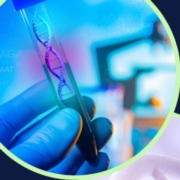
- Molecular Genetic Pathology Review Course
-
Join our faculty of molecular genetic pathology experts to prepare for a certification exam, earn continuing education credits, receive a refresher in molecular pathology core concepts, and stay up to date in the field. The course is a live event held biennially on odd years and then made available as a self-paced ondemand course in even years.
-
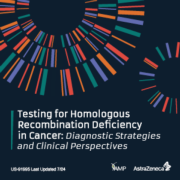
- Testing for Homologous Recombination Deficiency in Cancer: Diagnostic Strategies and Clinical Perspectives
-
This course we will provide a comprehensive overview of the ways in which HRD is relevant to contemporary cancer care. The presenters will define HRD, describe clinical assays that have been used to detect it, and discuss scenarios in which HRD could affect patient care. The course has a special focus on interdisciplinary communication and teamwork between pathologists and clinicians.
-
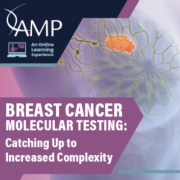
- Breast Cancer Molecular Testing: Catching Up to Increased Complexity
-
This four-part webinar series will address molecular testing in breast cancer, covering areas such as multi-gene assays, therapeutic predictive testing, somatic next-generation sequencing, and germline testing.
-

- Breast Cancer Virtual Education Series
-
In collaboration with expert pathologists and genetics counsellors, the Association for Molecular Pathology (AMP), AstraZeneca, & MSD have developed educational modules on the importance and methodology behind BRCA testing in early and advanced breast cancer. This Virtual Education Series consists of modules designed to provide training on the theoretical, technical, and practical aspects of diagnostic testing in breast cancer. Modules can be completed in any order.
-
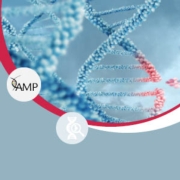
- Emerging and Evolving Biomarkers: Recent Findings, Laboratory Considerations, and Clinical Implications
-
The extraordinary advancements made over the past several years in the clinical management of cancer have ushered in a new era of optimism for those afflicted with many cancer types. However, these advancements have also created a highly complex environment for healthcare providers and diagnostic laboratory personnel.
This webinar series will efficiently describe emerging and evolving biomarkers. Read more about this series in this JMD article.
-
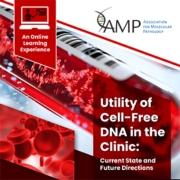
- Utility of Cell-free DNA in the Clinic: Current State and Future Directions
-
This eight-part webcast series on liquid biopsy titled, “Utility of Cell-free DNA in the Clinic: Current State and Future Directions.” will cover a range of concepts from the basic biological underpinnings of cell-free DNA (cfDNA) to new and specific advances (and the clinical implications thereof) in the diagnostic and prognostic use of cell-free DNA (cfDNA) and circulating tumor DNA (ctDNA). These eight webcasts will occur every 2-3 months, beginning in May, 2021.
In addition to the eight hour-long webinars, a series of “Molecular in a Minute” micro-learning modules will be recorded. These will cover new topics, advances, and applications for liquid biopsy in the laboratory and in the clinic. Links coming soon.
After broadcast, each webinar and Molecular in a Minute module will be posted on the AMPEDTM online Learning Management System. Keep checking back here for additional content and information.
-

- Ovarian Cancer Virtual Education Series
-
In collaboration with expert clinicians, The European Society of Pathology (ESP), the Association for Molecular Pathology (AMP), AstraZeneca, & MSD have developed educational modules on diagnostic testing in ovarian cancer patients. This Virtual Education Series consists of key modules designed to provide training on the theoretical, technical, and practical aspects of diagnostic testing in ovarian cancer, as well as supporting videos and a self-assessment to ensure the principles and need for diagnostic testing are understood.
This five-part series consists of key modules designed to provide training on the theoretical, technical, and practical aspects of diagnostic testing in ovarian cancer.
-
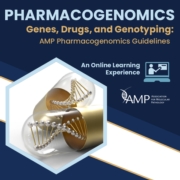
- Pharmacogenomics: Genes, Drugs, and Genotyping: AMP Pharmacogenomics Guidelines
-
Pharmacogenomics is an important and evolving area of medical testing that combines pharmacology and genomics to identify genomic variability that can affect individual drug response. There is a need in the general medical and laboratory communities to understand the fundamentals of pharmacogenomics and the impacts of molecular testing on optimizing drug selection. This certificate program is intended to provide an introduction to pharmacogenomics and to review AMP expert consensus recommendations for standardization of alleles for clinical pharmacogenomic genotyping assays.
-
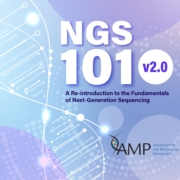
- NGS101 v2.0: A Re-Introduction to the Fundamentals of Next-Generation Sequencing
-
This AMP Certificate Program is an update of the very popular NGS101. Whether you’re looking to add Next-Generation Sequencing (NGS) to your lab or need a refresher, this course delivers the most current and useful information to help you in your decision making process. This 7-part course (including 6.50 hrs of CME or CMLE credit) is a comprehensive primer on implementing and running NGS in your laboratory.
-
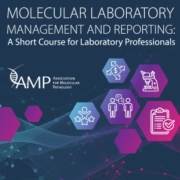
- Molecular Laboratory Management & Reporting: A Short Course for Laboratory Professionals
-
While most molecular pathology professionals receive a deep foundation in science and clinical practice, there is still a critical need for training in laboratory management and the soft skills required for operational effectiveness. This certificate program will provide an overview of best practices in many areas of laboratory management and reporting. See also, the JMD article highlighting the content of the course.

















